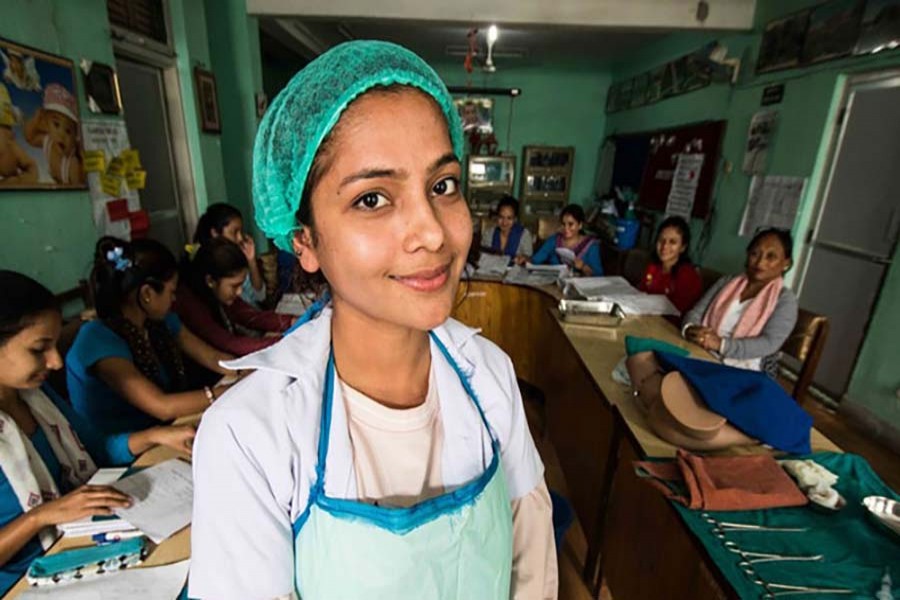'Saving lives and protecting livelihoods ought to go hand in hand. We cannot do one without the other', was the message Kristalina Georgieva wished to convey at a press conference that was also addressed by World Health Organisation (WHO) Director General Dr Tedros Adhanom Ghebreyesus on April 03 last.
The message does deserve serious attention from governments and relevant others across the world.
Frantic efforts are being made at both national and international levels to rein in the pandemic and saving lives in most countries. The main problem the frontline health workers facing is that the highly contagious Covid-19, caused by a new novel coronavirus, has no cure as of now. Medical researchers have employed all their efforts across the world to find an effective drug and, more importantly a vaccine against the virus. Finding a vaccine may take many months though people across the world expect it to be ready by next morning. If the researchers could manage a vaccine even in 18 months they would be setting a world record.
Governments in countries hit by the virus have clamped lockdown to prevent the disease from spreading. About half of the world population is now staying at homes as part of the programme of social distancing. Barring emergency services such as hospitals and food stores all establishments, large and small, are now closed. Transports are not allowed on the streets. However, enforcement of the lockdown varies from country to country. The countries most affected by the virus, particularly those in Europe, are more serious about enforcing strict lockdown.
But it has become increasing difficult to keep all the people confined to their homes. The majority, however, voluntarily are staying indoors. But in many poor developing countries, including Bangladesh, it has become truly difficult to keep millions of people confined to their homes. The self-employed people and many others who sell their labour daily to earn a living are finding it hard to survive with all economic activities remaining almost standstill for more than several weeks. They have become increasingly restive. Actions on the streets by the law enforcing agencies and security forces are proving to be ineffective in many areas to keep people at home, which is one of the most effective means to defeat coronavirus. The daily wage earners, including rickshaw-pullers are heard saying 'if the situation goes like this for some more days, we will die from starvation before coronavirus catches us'.
Pictures published in the yesterday's newspapers showing the garment workers, who went home in their thousands following the announcement of unscheduled holidays by the government since March 26 last, returning to Dhaka by hiring trucks, pickups, auto-rickshaws and even by walking to join their respective workplaces. They do not want to lose their jobs as a section of owners has decided to reopen their apparel units from Sunday. Getting monthly wage is also yet another important issue that has forced them to rush to Dhaka and its adjacent industrial areas.
However, the two trade bodies---the Bangladesh Garment Manufacturers and Exporters Association (BGMEA) and the Bangladesh Knitwear Manufacturers and Exporters Association (BKMEA)---requested their member units not to open their units because of the health risks involved in it. The belated directive speaks volume about sheer carelessness of a section of the owners of RMG units.
This is a pitiable situation. It does also highlight the lack of coordination among important government and private agencies. Since the government declared holidays for every sectors barring a few selected ones, then why should the RMG units that while in operation are not able to maintain social distancing? It seems there is a dilemma in the government circles over keeping the industrial units, particularly the export-oriented ones, closed during the lockdown period.
There is no denying that keeping the wheels of the economy moving is a priority job for the government, but meeting the health emergencies remains to be the top-most priority right at this moment. Any relaxation of the restrictions through a rash decision, according to the WHO DG, would leave severe consequences. There could be resurgence of the virus attack, causing even far-reaching and serious damage to the economy, he warned at a press briefing held on Saturday.
The poor and the distressed section of the population is the worst-hit by the pandemic that has pushed the world into a recession. The IMF managing director has found the ongoing recession even worse than that of 2008. The plight of nearly 700,000 homeless people in Europe has increased manifold in the wake of the pandemic. They are finding it difficult to have food and clothes from passersby as streets are now deserted following the lockdown.
One can well imagine the state of poor people in Bangladesh in such a situation. In cities, there have been sporadic private initiatives to distribute food among poor and floating population. In some cases, such efforts have drawn public criticism for failure on the part of the organisers to maintain social distancing. It is also not clear how effective has been the government initiative to distribute food and other assistance among the poor families and returnees from cities and towns to village under the 'Ghorefera' and other safety net programmes at the grassroots.
What the government is now doing with utmost urgency is that it is trying to stop coronavirus from spreading further. This is important to save lives from the onslaught of the dreadful virus. Since many avenues of earning livelihoods by the poor and self-employed people are now closed, it will be equally important to offer them the means to survive under a disciplined mechanism. Members of the armed forces, who are already in the field could be used for the purpose.


